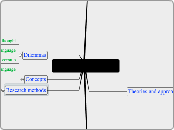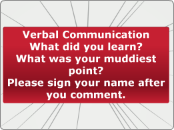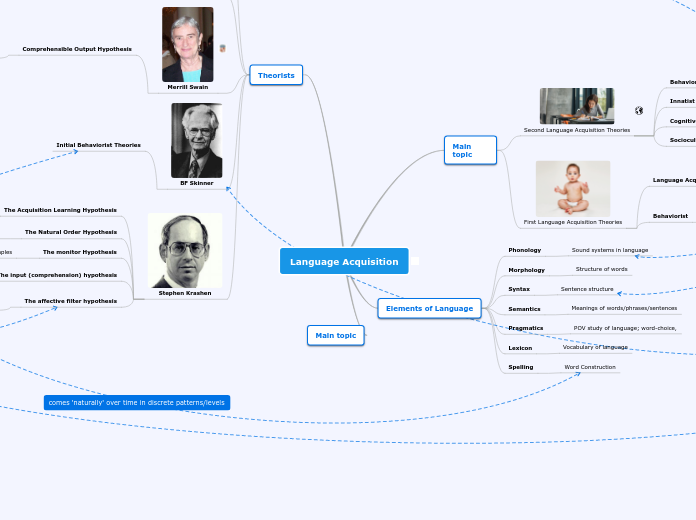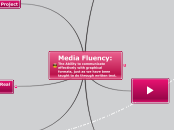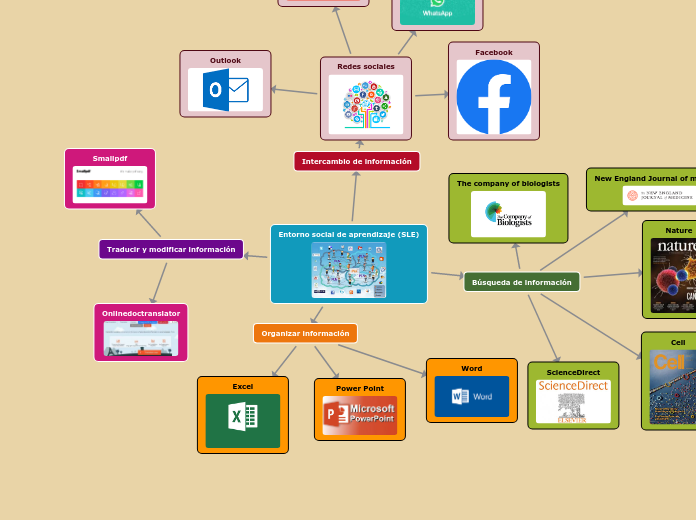Thinking and Language
Educational policy issues
Textbook design
Foreign-language instruction
Inclusive education
Bilingual education
Research methods
Thought
Brain
Cognitive abilities
Introspection
Experiments
Language tasks (e.g. map reading)
Response speed measuring
Eye-movement tracking
Attention measuring
Second language acquisition
Interviews
Outcome studies
Observational studies
Diary studies
Language acquisition
Experimental studies
Unelicited
Elicited
Multi-child longitudinal studies
Own child observation
Recording (Language in the crib)
Note taking
Language system
Study of aphasias
Corpus studies
Frequency
Evidence of usage
Distributional analysis
Contrastive analysis
Introspection/Informants
Theories and approaches
Information Processing
Developmental psychology
Construtivist psychology
Cognitive psychology
Behavioral psychology
Gestalt psychology
Conversation analysis
Linguistic Relativism
Cognitive linguistics
Language as inventory of conventional symbolic units
Anti-modular
Usage-based approach
Functional linguistics
Generative linguistics
Modularity
Competence/Performance
LAD
Structuralism
Value of linguistic signs
Minimal oppositions
People
Psychology
Eleanor Rosch
B.F. Skinner
Jerome Bruner
Jean Piaget
Lev S. Vygotsky
Linguistics
George Lakoff
William Labov
MAK Halliday
Noam Chomsky
Benjamin Lee Whorf
Ferdinand de Saussure
Concepts
Language
Aphasias
Acquisition
Language Acquisition Device (LAD)
Poverty of stimulus argument
Learnability
Universal Grammar
Parameters
Principles
Stages of development
Timeline
6-12 years
Development of higher-level modalities
Development of textual skills
3-6 years
Increase in vocabulary (app. 1000-5000 words)
Development of adult-like sentential syntax
Overregularization
2-3 years
Discovery of patterns with increasing productivity
18 months - 2 years
Limited repertoire of words
12-18 months
Understanding commands
First words
6-12 months
Babbling
0-6 months
Important concepts
Adult competence
Bootstrapping
Telegraphese
Pivot sentences
Motherese
U-shaped curve
Functions of language
Textual
Coherence
Cohesion
Interpersonal (Social)
Language change
Group cohesion
Information
Conversation
Ideational (Meaning, information)
Sign Language
Symbolic nature
Segmentation
Mutual intelligibility
Bilingualism
Diglossia
Creolisation/Pidginisation
Language ability
Code switching
Structure
Semantics/Pragmatics
Speech acts
Implicature
Lexical meaning
Collocations
Rules
Constructions
Levels of description
Text/Discourse
Syntax
Lexicon
Morphology
Phonology
Privative oppositions
Thinking
Affective factors
Modality
Motivation
Emotion
Cognition
Complex cognitive operations
Reasoning
Reading
Comprehension
Functional literacy
Instructional approaches
Phonics
Whole word
Conceptual Integration
Metaphoric and analogic reasoning
Metaphorical inferencing
Global
Generative
Constitutive
Local
Blending
Mental spaces
Framing
Scripts
Schemas
Categorization
Basic-level categories
Prototypes
Mental operations
...
Logical inferencing
Pattern recognition
Shape manipulation
Perception
Dilemmas
Limits of language
Language universals
Modularity of language
Primacy of language or thought
